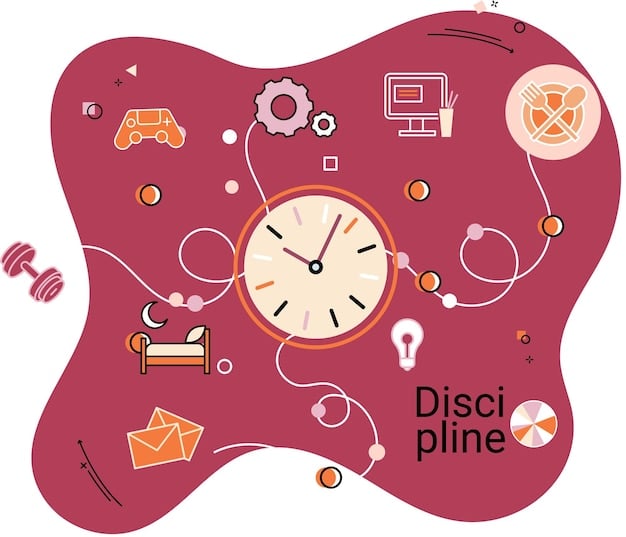Mastering Time Management: A Student’s Guide

Mastering time management is crucial for students juggling academics and extracurriculars, requiring effective strategies to balance study, activities, and personal life for success and well-being.
Mastering time management is an essential skill for students striving to excel academically while also participating in extracurricular activities. Successfully balancing these commitments not only reduces stress but also enhances overall productivity and personal development. This guide provides effective strategies to help students navigate their busy schedules and achieve their goals.
Understanding the Importance of Time Management
Time management is not just about fitting more activities into your day; it’s about making the most of the time you have. For students, this means balancing academic responsibilities with extracurricular commitments, social activities, and personal needs. Effective time management can lead to improved grades, reduced stress, and a greater sense of accomplishment.
Why Time Management Matters for Students
Students often juggle multiple responsibilities, making time management a crucial skill for success. It’s not just about getting things done, but getting the right things done effectively.
- Improved Academic Performance: By managing time effectively, students can allocate sufficient time to studying, completing assignments, and preparing for exams, leading to better grades and a deeper understanding of the material.
- Reduced Stress: Feeling overwhelmed and stressed is common among students. Effective time management can alleviate this by providing a structured approach to managing tasks, preventing last-minute rushes and reducing anxiety.
- Enhanced Personal Development: Time management allows students to pursue extracurricular activities, hobbies, and social interactions, contributing to a well-rounded and fulfilling college experience. It fosters discipline, responsibility, and the ability to prioritize, all valuable life skills.
Setting Goals and Priorities
Effective time management begins with setting clear goals and prioritizing tasks. This provides a roadmap for your efforts and ensures you focus on what truly matters.
- Define Your Goals: Start by identifying your academic and personal goals. What do you want to achieve this semester? What extracurricular activities are most important to you?
- Prioritize Tasks: Use methods like the Eisenhower Matrix (urgent/important) to categorize your tasks. This helps you focus on high-priority activities that align with your goals.
- Break Down Large Tasks: Large assignments can seem daunting. Break them down into smaller, manageable steps to make them less intimidating and easier to complete.
In conclusion, understanding the importance of time management is the first step toward achieving a balanced and successful student life. By recognizing its benefits and setting clear priorities, students can lay the groundwork for improved academic performance, reduced stress, and enhanced personal development.
Effective Time Management Techniques
There are numerous time management techniques that can help students optimize their schedules. From using digital tools to employing traditional methods, finding the right approach is key to staying organized and productive.

The Pomodoro Technique
The Pomodoro Technique is a time management method that uses focused work intervals interspersed with short breaks. This can help maintain concentration and prevent burnout.
- How It Works: Work in focused 25-minute intervals (Pomodoros) followed by a 5-minute break. After four Pomodoros, take a longer 20-30 minute break.
- Benefits: Enhances focus, improves productivity, and prevents mental fatigue. The short breaks provide opportunities to rest and recharge.
- Tips: Use a timer to track your Pomodoros and breaks. Avoid distractions during work intervals to maximize effectiveness.
Time Blocking
Time blocking involves scheduling specific blocks of time for different tasks. This can provide structure to your day and ensure you allocate sufficient time to each activity.
- How It Works: Divide your day into blocks of time and assign specific tasks to each block. Be realistic about how much time each task will take.
- Benefits: Provides a clear structure for your day, ensures you allocate time to all important tasks, and reduces procrastination.
- Tips: Use a calendar or planner to create your time blocks. Be flexible and adjust your schedule as needed to accommodate unexpected events.
Choosing the right time management techniques can significantly improve a student’s ability to handle their workload effectively. Techniques like the Pomodoro method and time blocking offer structure and help maintain focus, leading to increased productivity and reduced procrastination.
Creating a Realistic Schedule
Developing a realistic schedule is essential for effective time management. This involves assessing your commitments, allocating time for each activity, and building in flexibility to accommodate unexpected events.
Assessing Your Commitments
Before creating a schedule, take stock of all your commitments. This includes classes, study time, extracurricular activities, work, and personal obligations.
- List All Activities: Make a comprehensive list of all your regular activities and estimate the amount of time each requires.
- Identify Peak Energy Times: Determine when you are most alert and productive. Schedule your most demanding tasks for these times.
- Consider Travel Time: Account for the time it takes to travel between classes, activities, and home. This can significantly impact your schedule.
Balancing Academics and Extracurriculars
Balancing academic responsibilities with extracurricular activities requires careful planning and prioritization. Avoid overcommitting yourself and ensure you have time for rest and relaxation.
- Prioritize Academic Tasks: Ensure you allocate sufficient time to studying, completing assignments, and preparing for exams.
- Schedule Extracurriculars: Allocate specific blocks of time for extracurricular activities, ensuring they don’t interfere with your academic commitments.
- Build in Buffer Time: Leave some buffer time in your schedule to accommodate unexpected events or delays. This can help prevent stress and keep you on track.
Creating a realistic schedule that balances academics and extracurriculars is crucial for any student aiming for success. By carefully assessing their commitments and building in buffer time, students can manage their workload effectively and maintain a healthy balance in their lives.
Overcoming Procrastination and Staying Focused
Procrastination and lack of focus can derail even the best time management plans. Understanding the causes of procrastination and implementing strategies to stay focused are essential for academic success.
Identifying the Causes of Procrastination
Procrastination often stems from fear of failure, perfectionism, or lack of interest in a task. Identifying these underlying causes can help you develop strategies to overcome them.
- Fear of Failure: Some students procrastinate because they fear they won’t be able to meet expectations or perform well.
- Perfectionism: The desire to do everything perfectly can lead to procrastination. Students may delay starting a task because they are afraid of making mistakes.
- Lack of Interest: When a task seems boring or irrelevant, it’s easy to put it off. Finding ways to make the task more engaging can help overcome this.
Strategies for Staying Focused
Staying focused requires creating a conducive study environment, minimizing distractions, and employing techniques to maintain concentration.

- Create a Dedicated Study Space: Choose a quiet, well-lit area where you can study without distractions. Keep your study space organized and free of clutter.
- Minimize Distractions: Turn off notifications on your phone and computer, and avoid social media while studying. Use website blockers if necessary.
- Use Active Study Techniques: Engage with the material by taking notes, summarizing key points, and teaching the concepts to someone else. This can help maintain focus and improve retention.
Overcoming procrastination and staying focused is vital for effective time management. By identifying the underlying causes of procrastination and implementing strategies to minimize distractions, students can improve their focus and achieve their academic goals.
Utilizing Technology and Tools for Time Management
Technology offers a wide range of tools and apps that can help students manage their time effectively. From digital calendars to task management apps, these resources can streamline your schedule and enhance productivity.
Digital Calendars and Planners
Digital calendars and planners provide a convenient way to schedule appointments, set reminders, and track deadlines. Many apps offer features like color-coding, recurring events, and integration with other productivity tools.
- Google Calendar: A versatile calendar app that allows you to create events, set reminders, and share your schedule with others.
- Microsoft Outlook Calendar: A robust calendar tool integrated with email and other Microsoft Office apps.
- iCalendar: Apple’s built-in calendar app that syncs seamlessly across all your devices.
Task Management Apps
Task management apps help you organize tasks, set deadlines, and track your progress. These apps often include features like priority setting, subtasks, and collaboration tools.
- Todoist: A popular task management app with features like natural language input, priority levels, and integration with other apps.
- Trello: A visual task management tool that uses boards, lists, and cards to organize projects and tasks.
- Asana: A comprehensive project management app that allows you to create tasks, assign deadlines, and track progress.
Utilizing technology and time management tools can significantly enhance students’ ability to stay organized and productive. Digital calendars and task management apps provide practical solutions for scheduling, prioritizing, and tracking tasks, ultimately leading to better academic outcomes and reduced stress.
Maintaining a Healthy Work-Life Balance
While academic success is important, it’s essential to maintain a healthy work-life balance. Neglecting your physical and mental well-being can lead to burnout and decreased productivity.
Prioritizing Self-Care
Self-care activities can help you recharge, reduce stress, and maintain your overall well-being. Make time for activities you enjoy, such as exercise, reading, or spending time with friends and family.
- Exercise Regularly: Physical activity can help reduce stress, improve your mood, and boost your energy levels. Aim for at least 30 minutes of exercise most days of the week.
- Get Enough Sleep: Aim for 7-8 hours of sleep per night. Adequate sleep is essential for cognitive function, mood regulation, and overall health.
- Eat a Healthy Diet: Nourish your body with a balanced diet that includes plenty of fruits, vegetables, and whole grains. Avoid processed foods, sugary drinks, and excessive amounts of caffeine.
Setting Boundaries
Setting boundaries is crucial for maintaining a healthy work-life balance. Learn to say no to commitments that will overextend you, and protect your personal time.
- Learn to Say No: It’s okay to decline invitations or requests that will add unnecessary stress to your schedule. Be polite but firm in your refusal.
- Protect Your Personal Time: Designate specific times for relaxation and social activities, and avoid working during these times.
- Communicate Your Needs: Let your friends, family, and professors know your boundaries and expectations. This can help prevent misunderstandings and ensure you have the support you need.
Maintaining a healthy work-life balance is integral to students’ overall well-being and academic success. By prioritizing self-care and setting clear boundaries, students can prevent burnout, reduce stress, and enhance their productivity and happiness.
| Key Point | Brief Description |
|---|---|
| ⏰ Pomodoro Technique | Works in focused intervals with short breaks to prevent burnout. |
| 🗓️ Time Blocking | Schedules specific time for tasks, providing structure and reducing procrastination. |
| 🧘 Self-care | Prioritizes activities like exercise and sleep to maintain well-being. |
| 📱Utilizing technology | Apps for scheduling, reminders, and task organization. |
Frequently Asked Questions
▼
Start by identifying your priorities and assessing your current time commitments. Make a list of your daily activities and identify areas where you can make improvements. Then, choose a time management technique that works for you.
▼
To balance academic and extracurricular activities, carefully plan your time. Allocate specific blocks of time for studying and attending classes, and schedule your extracurricular activities around those commitments. Avoid overcommitting yourself and prioritize tasks.
▼
If you start to feel overwhelmed, take a step back and reassess your schedule. Break down large tasks into smaller, manageable steps, and prioritize the most important ones. Don’t hesitate to seek help from friends, family, or academic advisors.
▼
Technology and time management tools can help you stay organized and productive. Use digital calendars to schedule appointments and set reminders, and utilize task management apps to organize tasks, set deadlines, and track your progress.
▼
Maintaining a healthy work-life balance is crucial for your overall well-being and academic success. Neglecting your physical and mental health can lead to burnout and decreased productivity. Prioritize self-care and make time for activities you enjoy.
Conclusion
In summary, mastering time management as a student involves understanding its importance, employing effective techniques, creating realistic schedules, overcoming procrastination, utilizing technology, and maintaining a healthy work-life balance. By implementing these strategies, students can enhance their academic performance, reduce stress, and achieve their goals.





